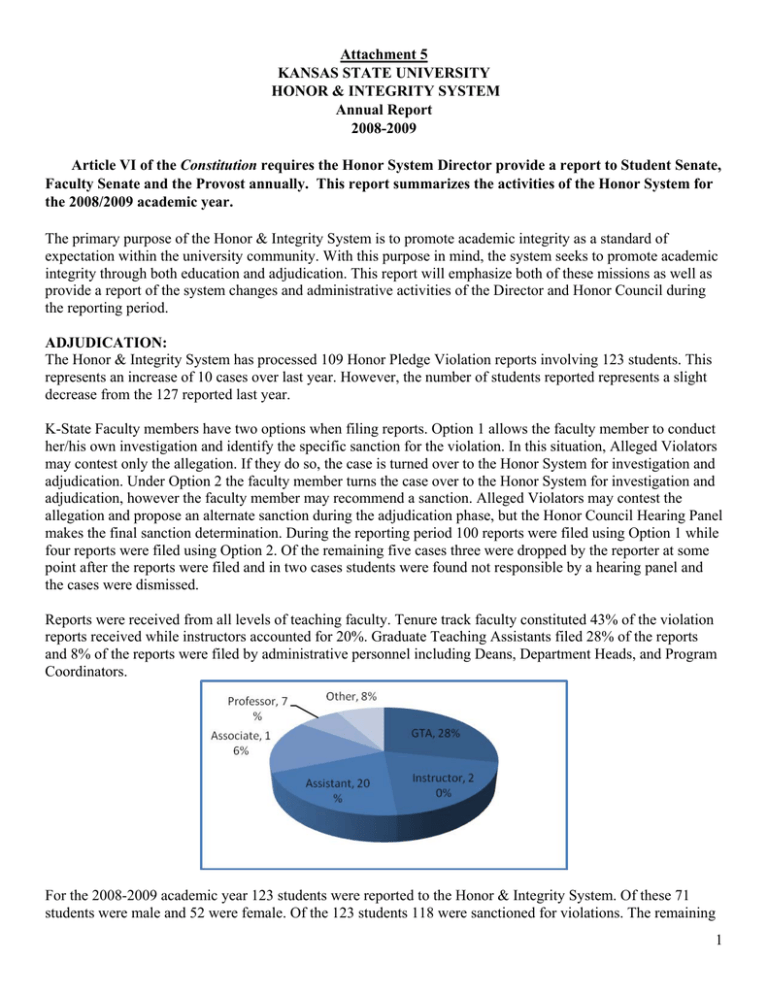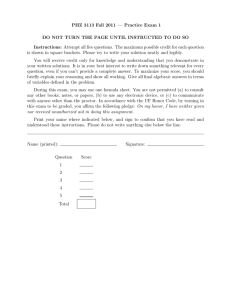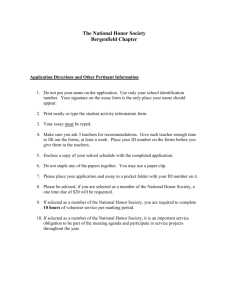Constitution Attachment 5 KANSAS STATE UNIVERSITY
advertisement

Attachment 5 KANSAS STATE UNIVERSITY HONOR & INTEGRITY SYSTEM Annual Report 2008-2009 Article VI of the Constitution requires the Honor System Director provide a report to Student Senate, Faculty Senate and the Provost annually. This report summarizes the activities of the Honor System for the 2008/2009 academic year. The primary purpose of the Honor & Integrity System is to promote academic integrity as a standard of expectation within the university community. With this purpose in mind, the system seeks to promote academic integrity through both education and adjudication. This report will emphasize both of these missions as well as provide a report of the system changes and administrative activities of the Director and Honor Council during the reporting period. ADJUDICATION: The Honor & Integrity System has processed 109 Honor Pledge Violation reports involving 123 students. This represents an increase of 10 cases over last year. However, the number of students reported represents a slight decrease from the 127 reported last year. K-State Faculty members have two options when filing reports. Option 1 allows the faculty member to conduct her/his own investigation and identify the specific sanction for the violation. In this situation, Alleged Violators may contest only the allegation. If they do so, the case is turned over to the Honor System for investigation and adjudication. Under Option 2 the faculty member turns the case over to the Honor System for investigation and adjudication, however the faculty member may recommend a sanction. Alleged Violators may contest the allegation and propose an alternate sanction during the adjudication phase, but the Honor Council Hearing Panel makes the final sanction determination. During the reporting period 100 reports were filed using Option 1 while four reports were filed using Option 2. Of the remaining five cases three were dropped by the reporter at some point after the reports were filed and in two cases students were found not responsible by a hearing panel and the cases were dismissed. Reports were received from all levels of teaching faculty. Tenure track faculty constituted 43% of the violation reports received while instructors accounted for 20%. Graduate Teaching Assistants filed 28% of the reports and 8% of the reports were filed by administrative personnel including Deans, Department Heads, and Program Coordinators. For the 2008-2009 academic year 123 students were reported to the Honor & Integrity System. Of these 71 students were male and 52 were female. Of the 123 students 118 were sanctioned for violations. The remaining 1 5 students were involved in cases which were either dismissed during the investigation process or were found not responsible by a hearing panel. A breakdown of the students by classification can be found in the following chart. The percentage of violations committed by Junior and Senior students is higher than previous years. While I reported a steady decline in these numbers in previous reports this trend did not continue for the 20082009 academic year. Considering 57% of the violations reported to the Honor & Integrity System were committed by upper classman and graduate students I believe this should be an area of interest to the university community. Of the 118 students sanctioned six had previously been reported to the Honor & Integrity System. These students were required to appear before a hearing panel to decide if further sanctions were necessary. As per the FERPA regulations our office is not authorized to share previous violation reports with faculty. Therefore, at times the sanctions applied for violations in one class may not be suitable for someone who has committed the violation previously. Therefore, each case and subsequent sanction is reviewed by a hearing panel and a sanctioning determination is made. In reviewing each of the second violation reports, hearing panels opted to elevate the level of sanctioning in all instances. One student was recommended for expulsion and one student was recommend for suspension until the fall semester of 2010. These recommendations were forwarded to Provost Nellis who supported the decisions and took the appropriate actions to process the recommendations. The other four students were given additional sanctions including, community service hours to be performed in conjunction with the activities of the Honor & Integrity System, the requirement to complete the Development and Integrity course, formal written letters of apology to various instructors and administrative personnel involved in the reporting actions, and requirements to complete research papers dealing with various forms of academic dishonesty. In each of these four cases, the hearing panels recommended that should these students appear before another hearing panel for an additional violation they should be considered for suspension or expulsion from the university. The Honor Council conducted 21 case investigations during the reporting period, four of which were cases carried over from the 2007-2008 academic year. Case Investigators recommended dismissing three of the 21 cases due to insufficient information. The Director shared the recommendation with the faculty reporters and the decision was made to withdraw the violation reports. Thirteen investigations and subsequent hearings were initiated based upon the students’ desire to contest the violation reports. Eleven of these cases resulted in the Hearing Panel finding sufficient information to hold the students accountable for a violation of academic integrity. In two of the cases the Hearing Panel felt sufficient information was not provided to find the students responsible. During the fall semester of 2008, four cases were adjudicated from the 2008-2009 semester. These cases were reported during the spring and summer of 2008 and were not completed by the time the 2007-2008 annual report was compiled. 2 As with past years, the largest form of Honor Pledge Violations involved plagiarism (39 cases). Many of these incidents were linked to internet sources. The second largest form of academic dishonesty involves engaging in unauthorized collaboration (30 cases) which includes the giving or receiving of information on test, quizzes, or assignments. Additional cases (24) were filed listing both plagiarism and unauthorized collaboration as the violation. The cases typically are filed when students submit work given to them by another student who has previously submitted the work for grading. Therefore the work is not original and was given for the purpose of submission by someone other than the original author. In these cases both parties involved are charged with a violation when possible. It should be noted the system does not always receive the support from the students in identifying the original source of the work. Fifteen cases were reported involving falsification. Falsification is the deliberate concealment of the true origin of data, forgery of signatures (scantron sheets or doctor notes) or submitting tests, quizzes, or assignments under false pretenses. Additional reports (6 cases) were filed alleging the use of unauthorized aid. The use of unauthorized aids relates to using textbooks, notes, or electronic devices when such aid is expressly prohibited by the instructor. This is probably the most frequent infraction of the honor pledge but is seldom discovered and reported by faculty and staff. As stated in past reports, the use of technological resources has created an environment in which resources are more readily available and easily concealed during testing situations. Additionally, this environment presents opportunities for collaboration in ways that are not easily identifiable. An example reported this year concerns the use of the electronic response system. A faculty member reported quiz responses were being submitted via the response mechanism for students who were not in class during the quiz. This was discovered via an alternate method of checking attendance that relied upon group work. Given that the class contained over 150 students the instructor could not physically recognize all students and therefore could not determine if the students whose responses were submitted were actually in the room at the time. The incident was brought to the attention of the instructor by students who witnessed another student operating multiple response mechanisms during the quiz. The student was also overheard to complain about having to work two “clickers” because her roommate was “too lazy to get out of bed”. The instructor then examined the available information and was able to determine five students who were not present for the group work had quiz responses submitted for them by someone who was present in the room. These students were reported to have violated the honor pledge. While advances in technology do facilitate rapid responses and provide good assessment data for instructors it should be noted that unless monitored appropriately the data provided by students may contain confounding variables which may flaw assessment data. Additionally, the Honor & Integrity System recommends including very clear syllabus statements regarding the unethical submission of information for another student via this technology. An examination of the sanctions assigned by either faculty reporters or hearing panels indicates most students received multiple sanctions. During the reporting period 30 XFs were assigned. In addition, 65 students were required to enroll in the Development and Integrity course. A grade of zero was assigned to 51 students and 31 students received reduced grades on assignments. Instructors sanctioned 18 students by placing a cap on the course grade and 21 warnings were issued. Additionally, 14 students were required to redo assignments or papers. Finally, three students were assigned community service projects in which they were required to develop and deliver presentations to a class related to the importance of academic integrity within the university. As mentioned earlier, hearing panel did make recommendations for one suspension and one expulsion for the 2008-2009 academic year. At the time of this report the Honor Council currently has one hearing pending from the spring semester. This hearing is the result of a second uncontested violation reported at the end of the spring semester. Additionally, six cases will begin the investigation process during the fall semester. All reports were filed after the final exam dates in the spring and were postponed until the fall semester. An additional six cases filed during the summer months have yet to be resolved. The students have not responded to requests for contact but we do anticipate being able to contact these students upon their return to classes on August 24th. A case by case summary can be found on the HIS website at http://www.k-state.edu/honor/honorsystem/HonorPledgeViolations0809.htm. 3 EDUCATION: A primary goal of the Honor & Integrity System is to promote academic integrity through education. In previous years this has been the responsibility of the Associate Director. As reported in my last annual report, Dr. Camilla Roberts was hired as the Assistant Director in the summer of 2008. After an initial evaluation period, I recommended to Provost Nellis that Dr. Roberts be promoted and given the title of Associate Director at the end of her first year. Dr. Nellis approved this recommendation based upon a solid performance of duties by Dr. Roberts. Please find below a record of her activities related to the educational initiatives of the Honor & Integrity System. Educational Presentations and HIPE: From August, 2008 through July, 2009, Dr. Roberts presented sixty presentations related to academic integrity and honesty. Through these 60 presentations, 3735 students and 103 faculty/staff were informed of the Honor and Integrity System. These presentations ranged from 10-15 minutes to four hour long workshops. Ten workshops were of particular interest as Dr. Roberts and a member of HIPE presented at Manhattan High School (MHS) to 10 freshmen English classes about plagiarism and the need to learn how to appropriately cite material in their research projects. These 10 presentations represented approximately half of the freshman class at MHS. The goal for the next year is to present to all Manhattan High School freshmen as they begin their research papers. Dr. Roberts also worked with the English Language Program (ELP) to develop a more in depth presentation to examine plagiarism in particular for several of the ELP advanced courses. This presentation was delivered on three occasions. The Honor & Integrity Peer Educator (HIPE) student group successfully participated in Homecoming activities to promote their organization. Some members have assisted with presentations which allow them to provide visibility for the organization. Integrity week occurred April 6-10, 2009. Although not all of the originally planned activities occurred, the students did advertise across campus, held a mock hearing in Salina, and had an information table at the Union for three days. The students learned to work ahead of time to plan larger events such as a movie in collaboration with Union Programming Council (UPC) and Association of Residence Halls (AHR) which they will incorporate into integrity week during the spring of 2010. The students have help advise students in the hearing process. Some Alleged Violators (AVs) did fail to make the connection with their HIPE member (even after the HIPE member sent numerous emails to check with them), however the HIPE members have taken this part of their role very seriously and met with many of the AVs on various occasions to answer questions they might have. Development and Integrity Course: During the fall 2008 semester, 39 students were enrolled in the face-to-face course offering and an additional 9 individuals enrolled in the online course. Nearly all students did successfully complete the class. One student failed to attend a class and was asked to take the class during the spring semester. One student in the online class failed to turn in many papers; therefore, she was unable to earn a “C” to successfully complete the class. Following completion of the fall semester class, adjustments for the spring class were made, including an addition of group projects to help address key topics. During the spring 2009 semester, 24 students were enrolled in the face-to-face course offering and an additional 6 students enrolled in the online course. In addition to the changes noted above, two practicum students (graduate students in SECPA from the College of Education) showed enthusiasm and interest in assisting in teaching the Development and Integrity Class. Having the practicum students brought in new ideas for the class and the students responded well to both practicum students. All students in the face-to-face class did receive at least a “C” for a passing grade for the course. Within the online course, 2 honor code violations did occur and one student received an XF for the course as a sanction for the violation. 4 The summer session of the Development and Integrity class was delivered in a face-to-face format, meeting every week day for two weeks. Six students successfully completed the course during the summer session. Feedback from these students revealed an appreciation for the fast paced course. Students communicated that meeting on a daily basis in order to continue discussion and ideas from one day to the next was very beneficial. In summary, during the 2008-2009 academic year, 69 students enrolled in the face-to-face Development and Integrity course while 15 enrolled in the online component. For future semesters, the face-to-face component will continue to encourage group participation through projects and presentations. The online component will be continually adapted to best meet the needs of the students involved. ADMINISTRATIVE: During conversations with the Provost in the fall semester of 2008, the Director communicated concerns regarding faculty awareness related to the Honor & Integrity System reporting process. During the spring semester of 2009 the Director contacted all department heads to arrange a short presentation to faculty members. The Director presented to 41 departments during the spring semester and plans to continue this effort during the fall 2009 semester. These meetings have been productive as a means for engaging faculty in conversation regarding instructional practice as well as conversations related to the use of plagiarism detection strategies. Currently several departments are investigating the use of software that will alleviate concerns regarding undetected plagiarism by students. Additionally, these meetings have been productive in helping to address concerns by faculty related to the reporting process and case management by the Honor & Integrity System. It is my hope that by the end of the fall semester I will have had the opportunity to visit with each of the remaining departments regarding these issues. No changes occurred in the Investigation and Adjudication procedures during the 2008-2009 academic year. As per the Honor & Integrity System Constitution, the Constitution and Investigation &Adjudication Procedures will be reviewed by Faculty Senate, Student Senate, and Graduate Council during 2010. In anticipation of this review, the Director will be gathering a small group of individuals to review concerns related to these documents during the fall and spring semester. Dr. David S. Allen Honor & Integrity System Director August 19, 2009 5




